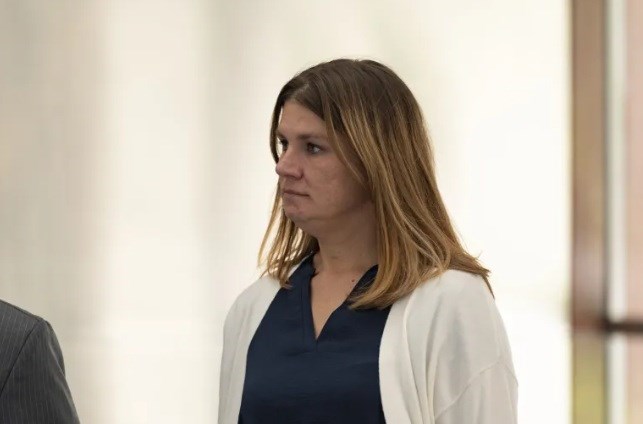
Tuesday February 4, 2025

Aimee Bock, the former executive director of Feeding Our Future, enters the federal courthouse in Minneapolis on October 16, 2024, for a hearing on a probation violation. Credit: Aaron Nesheim | Sahan Journal
MINNEAPOLIS (HOL) — A federal jury has been seated to hear the case against Aimee Bock, the founder and former executive director of Feeding Our Future, who is accused of orchestrating what prosecutors call one of the largest pandemic-related fraud schemes in the country. Bock and her sole remaining co-defendant, former Minneapolis restaurant owner Salim Said, face charges of conspiracy, wire fraud, and bribery for allegedly diverting millions of dollars intended to provide meals to low-income children during the COVID-19 pandemic.
A federal jury of nine men and seven women—including a teacher for autistic students, a cardiology nurse, a mental health counsellor, and a 911 dispatcher—has been selected to hear the high-profile trial against Aimee Bock.
Prosecutors contend that Feeding Our Future, under Bock’s direction, and a network of partner sites claimed to serve meals to thousands of children daily—far more than they actually served—using lax pandemic-era program rules to obtain nearly $250 million in federal child nutrition funds. The indictment alleges many of these sponsored meal sites existed only on paper, with funds funnelled into shell companies and used for personal gain, including luxury travel and real estate purchases.Said, who co-owned the now-shuttered Safari Restaurant in south Minneapolis, purportedly received millions of dollars for meals prosecutors say were never served. One set of reimbursement forms presented by the government claimed Safari was serving 6,000 children every day throughout January 2021, a number that far exceeded the restaurant’s capacity.
Of the 70 defendants charged in connection with the alleged conspiracy, 30 have already pleaded guilty. Several who initially denied wrongdoing changed their pleas in the days leading up to Bock’s trial, which prosecutors say underscores the breadth of evidence against the remaining defendants. Some of those who pleaded guilty are expected to testify during this trial, offering an inside view of how the alleged fraud was carried out.
Bock has maintained her innocence and argued that she was unaware of fraudulent invoices and meal counts submitted by associates. Her attorney, Kenneth Udoibok, has characterized his client as someone who was “hoodwinked” by people she trusted. He says she did not personally profit or accept bribes in exchange for approving meal sites and that her goal was to expand access to children in need. Bock’s legal team may also highlight the Minnesota Department of Education’s role in approving Feeding Our Future’s rapid growth, suggesting that state oversight was insufficient.
Minnesota Gov. Tim Walz has faced political pressure over the loss of federal funds, with critics accusing his administration of not acting sooner to stop the alleged fraud. State officials say they followed federal authorities’ instructions not to halt funding while the FBI investigation was ongoing. The scandal has prompted legislative discussions on tightening anti-fraud measures in Minnesota’s public benefit programs.
The trial begins under tight security measures following a startling incident in a related proceeding last year, when a juror was allegedly offered $120,000 in cash in exchange for a not-guilty verdict. Federal officials say they discovered a list of jurors’ names at a defendant’s home during their investigation. As a result, U.S. District Judge Nancy Brasel has ordered additional steps to preserve juror anonymity and prevent further tampering, including restricting defendants’ access to electronic devices in the courtroom and referring to potential jurors by numbers rather than names.
Opening statements are scheduled to begin Feb. 10, and the trial is expected to last about four weeks. Both defendants could face lengthy prison terms if convicted. Legal observers note that Bock’s decision on whether to testify could be pivotal, as she risks a vigorous cross-examination by prosecutors.

















